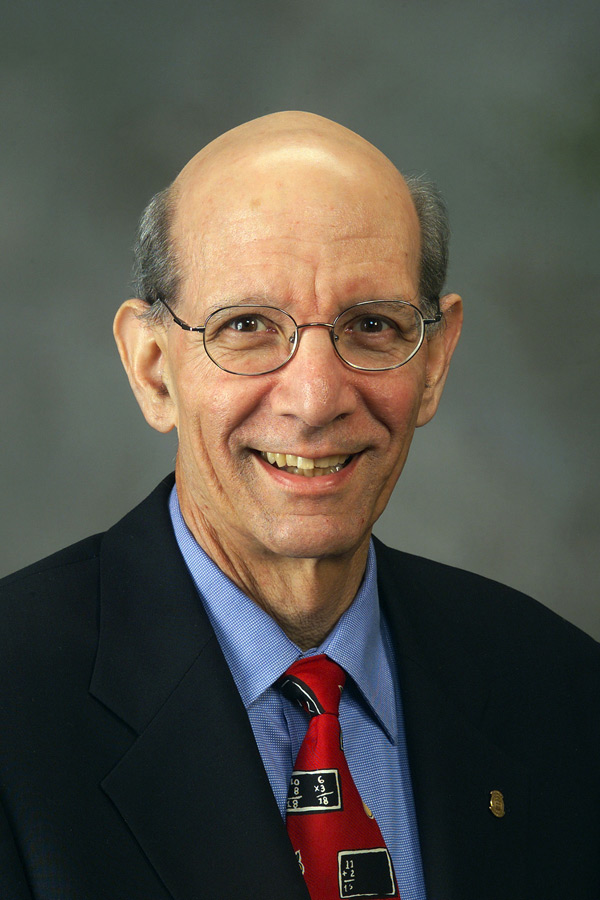Ezra Brown named Alumni Distinguished Professor

The Virginia Tech Board of Visitors conferred the title Alumni Distinguished Professor (ADP) to Ezra "Bud" Brown, professor of mathematics in the College of Science, in recognition of his extraordinary academic citizenship and distinguished service within the Virginia Tech community.
Through the generous support of the Virginia Tech Alumni Association, the Virginia Tech Board of Visitors bestows the Alumni Distinguished Professor designation to recognize members of the faculty who have made outstanding contributions to the instructional program of the university and who have touched the lives of generations of alumni. Only 11 professors throughout the university hold the title.
Brown, who joined the Virginia Tech faculty in1969, has won numerous awards for teaching and writing. He received the Mathematical Association of America (MAA) Carl B. Allendoerfer Award for Excellence in Expository Writing for an article in Mathematics Magazine; the MAA George Polya Award for Excellence in Expository Writing, twice, for articles in the College Mathematics Journal; the Golden Key International Honor Society Mid-Atlantic Region Advisor of the Year award; and the MAA Maryland-District of Columbia-Virginia Section's John M. Smith Award.
On campus, his honors include the ODK G. Burke Johnston Award for Teaching Excellence; Upsilon Pi Epsilon National Computer Science Honor Award; Wine Award; MAA Student Chapter's Outstanding Professor Award, three times; Edward S. Diggs Teaching Scholar Award; Honorary Member of Golden Key International Honor Society; Mortar Board Last Lecturer; and the College of Arts and Sciences Certificate of Teaching Excellence. He also delivered the university's Commencement address in fall 2003.
Brown has written more than 60 articles published in refereed journals, a book translation, and several book reviews and has given more than 70 invited presentations.
He has been involved in teacher development, from high school teachers to graduate teaching assistants, and helped develop the Calculus Emerging Scholars Program, which he directed for six years. He has served as a mentor to students from Virginia Tech's 2005 Marshall Scholar to students in the Department of Defense's Director's Summer Program.
Brown is associate editor of the American Mathematical Monthly and sits on the editorial boards of the Journal of Combinatorial Number Theory and Math Horizons. He chairs the MAA's Maryland-District of Columbia-Virginia Section's Teaching Award Committee and Section Nominating Committee and is the section program chair.
He holds a Ph.D. and Master of Science degree in mathematics from Louisiana State University and a bachelor's degree from Rice University.
The College of Science at Virginia Tech gives students a comprehensive foundation in the scientific method. Outstanding faculty members teach courses and conduct research in biology, chemistry, economics, geosciences, mathematics, physics, psychology, and statistics. The college is dedicated to fostering a research intensive environment and offers programs in nano-scale and biological sciences, information theory and science, and supports research centers—in areas such as biomedical and public health sciences, and critical technology and applied science—that encompass other colleges at the university. The College of Science also houses programs in pre-medicine and scientific law.
Founded in 1872 as a land-grant college, Virginia Tech has grown to become among the largest universities in the Commonwealth of Virginia. Today, Virginia Tech's eight colleges are dedicated to putting knowledge to work through teaching, research, and outreach activities and to fulfilling its vision to be among the top research universities in the nation. At its 2,600-acre main campus located in Blacksburg and other campus centers in Northern Virginia, Southwest Virginia, Hampton Roads, Richmond, and Roanoke, Virginia Tech enrolls more than 28,000 full- and part-time undergraduate and graduate students from all 50 states and more than 100 countries in 180 academic degree programs.




